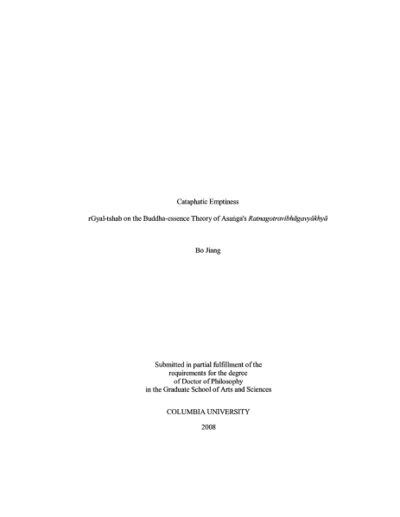- List of Tablesv
- AcknowledgmentsvI
- Technical Notesvii
Part 1: The Prāsaṅgika-Mādhyamika Interpretation of the Buddha-essence Theory
- Introduction2
- Chapter 1: Historical and Doctrinal Background17
- 1. rGyal-tshab's Life and Works17
- 2. The social-political background26
- 3. The doctrinal background29
- 4. The Structure and Contents of the rGyud bla ṭīkā33
- Chapter 2: Doctrinal Classification of the Ratnagotravibhāga37
- 1. Asaṅga and the Five Treatises of Maitreya38
- 2. The subtle emptiness according to the RGV41
- The truth-habit as the cause of saṃsāra41
- The truth-habit as the addictive obscuration43
- Śrāvakas and pratyekabuddhas' realization of objective selflessness44
- Refuting the Vijñānavādin standpoint concerning emptiness47
- 3. The Three Stages of Teaching according to the DIR49
- Establishing the unique vehicle49
- As the distinctive presentation of the Prāsaṅgika-Mādhyamika
viewpoint54
- 4. The Prajñāpāramitā-sūtra and the TGS56
- 5. The TGS as Being Definitive62
- Chapter 3: Critiques of Absolutism, Skepticism, and Quietism69
- 1. Critique of Dol-po-pa's "Great Madhyamaka"70
- Refuting Dol-po-pa's classification of the TGS71
- Refuting Buddha-essence as a permanent entity72
- Refuting Buddha-essence as being endowed with twofold purities77
- 2. Critique of the Mainstream Positions81
- 'Gos-lo's position on Buddha-essence84
- dGe-lugs-pa scholars' responses89
- 3. A Comparison with Critiques of "Original-enlightenment" theory in
Modern Chinese Buddhism94- A comparison of interpretations between 'Gos-lo and Zongmi96
- Modern Chinese Critiques of "Original-enlightenment"99
- 1. Critique of Dol-po-pa's "Great Madhyamaka"70
- Chapter 4: Analysis of the Title and Textural Structure110
- 1. The Title "Mahāyānottaratantra" and Its Implication110
- 2. The Seven Vajra-Like Bases114
- Two aspects114
- rGyal-tshab's revision of rNgog-lo's "two wheels" theory 116
- The first three bases as ultimate fruition118
- The last four bases as cause and conditions119
- 3. The Term "Ratnagotra" and the Textual Structure of RGV121
- 4. rGyal-tshab on the Fourfold Ratnagotra as Cause and Conditions124
- The Element as a cause according to RGV I.16124
- The last three bases as conditions127
- 5. On RGV 1.3129
- 6. Conclusion132
- Chapter 5: Reality, Element, and Natural Luminosity of the Mind134
- 1. The Buddha-essence and Its Various Names134
- 2. Reality136
- As immutable ultimate reality136
- The tainted reality138
- 3. Dharmatā140
- 4. Natural Luminosity of the Mind142
- Origin in Canonical sources142
- rGyal-tshab's Exegesis on the Passages from the SMS and the DIR144
- On the Passage from the GGS147
- 5. The Element150
- According to the AAN150
- According to the MAS154
- 6. The Buddha-essence and the Madhyamaka Philosophy156
- The Equation of the Buddha-essence with emptiness156
- Realizing the Buddha-essence as the Middle Way159
- 7. Conclusion163
- Chapter 6: Buddha-essence and Its Ten Aspects164
- 1. The Tripartite Buddha-essence164
- The diffusion of the truth body166
- The indivisible reality and generic potentials168
- 2. The Ten Points170
- Nature171
- Causes173
- Fruition178
- Actions187
- Possession192
- Engagement194
- States196
- All-pervadingness198
- Unchangeability200
- Indivisible excellences205
- 1. The Tripartite Buddha-essence164
- Chapter 7: The Eighteen Similes in the Tathāgatagarbha-sūtra209
- 1. rGyal-tshab's General Discussion209
- 2. The Nine Smiles for the Obscuring Defilements215
- The lotus simile for latent state of attachment215
- The bees simile for latent state of hatred216
- The husks simile for latent state of misknowledge216
- The filth simile for intense outburst of attachment, hatred, and
misknowledge218 - The floor simile for ground of instincts for misknowledge219
- The fruit simile for addictions eliminated by the Path of Insight220
- The tattered rags simile for addictions eliminated by the Path of
Meditation221 - The woman simile for addictions related to the Impure Stages222
- The clay simile for addictions related to the Pure stages223
- Discussion of the twofold obscuration224
- 3. The Nine Smiles for the Obscured Element226
- The three similes for the Truth Body228
- The gold simile for reality230
- The five similes for the spiritual gene231
- Chapter 8: The Twofold Spiritual Gene236
- 1. Tsong-kha-pa's Analysis of the Vijñānavadin Standpoints237
- 2. A Mādhyamika Critique of the Vijñānavadin Standpoint248
- 3. The dGe-Iugs-pa Exegesis of the "Spiritual Gene" Section of the AA250
- 4. Natural Luminosity of the Mind under Debate256
- Conclusion264
- Abbreviations268
- Bibliography271
Part 2: Appendices
- 1. A Special Edition of Chapter One of the Theg pa chen po rgyud bla ma'i ṭīkā (1a-72a and 64a-170b)285
- A. Topical Outline285
- B. Special Edition306
- 2. Translations449
- A. The Mahāyānottaratantrarvyākhyā (Chapter One: 1.1-7.5 and 21.1-78.22)449
- B. The Theg pa chen po rgyud bla ma'i ṭīkā (Chapter One: 1a-72a and
64a-170b)525

